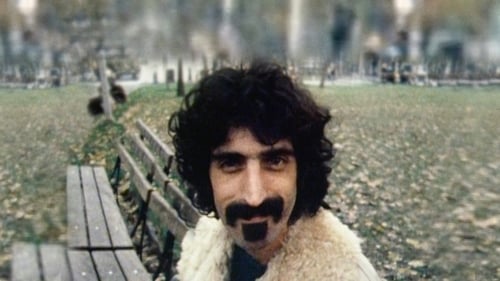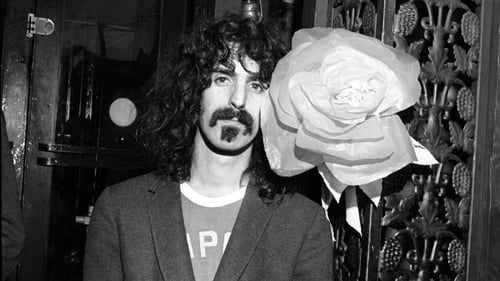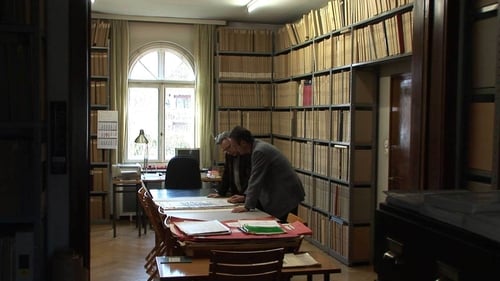
Self (archive footage)
With the help of more than 10,000 dedicated Zappa fans, this is the long-awaited definitive documentary project of Alex Winter documenting the life and career of enigmatic groundbreaking rock star Frank Zappa. Alex also utilizes in this picture thousands of hours of painstakingly digitized videos, photos, audio, writing, and everything in between from Zappa's private archives. These chronicles have never been brought to a public audience before, until now.

Himself
Utilizing potent TV interviews and many forgotten performances from his 30-year career, we are immersed into Frank Zappa’s world while experiencing two distinct facets of his complex character. At once Zappa was both a charismatic composer who reveled in the joy of performing and, in the next moment, a fiercely intelligent and brutally honest interviewee whose convictions only got stronger as his career ascended.

Self
A unique film portrait of the famous Italian pianist. Maurizio Pollini felt himself that the time had come to submit to the probing of the camera, an exercise made all the more necessary because of his usual avoidance of the public eye.

Knots and Fields examines the aesthetic debates and tensions that have animated the Darmstadt courses over six decades, exploring their relevance today in an increasingly globalised environment.

Conductor
Set in a Siberian prison camp, Janacek's final opera centers on the experiences of recent arrival Alexandre Petrovitch Goriantchikov (Olaf Bar), a nobleman who finds relief from the harsh conditions in the friendship of the illiterate Alyeya (Eric Stoklossa). Recorded at the Grand Theatre de Provence, this stage production is directed by the well-respected Patrice Chereau and features famed conductor Pierre Boulez. Filmed at the Aix-en-Provence Festival on 20 July 2007.

Self
In 2005, the Staatsoper Berlin and its orchestra, the Staatskapelle Berlin under musical director Daniel Barenboim, celebrated a series of events to celebrate the 80th birthday of French conductor and composer Pierre Boulez. Artistically associated for decades with Barenboim and Berlin, Pierre Boulez is one of today's most distinguished composers and conductors. As part of the celebration, Boulez conducted a performance of Mahler's "Resurrection" Symphony at the Berlin Philharmonie. With his uncompromising approach to the score, Pierre Boulez's Mahler readings have long fascinated critics and audiences alike. Boulez eschews the romanticized readings common in performance tradition and, instead, reveals the real joy and terror in Mahler's large-scale symphonies.

conductor
Pierre Boulez conducts the BBC Symphony Orchestra and Chorus in a special concert from the Barbican, as part of the composer's 80th birthday celebrations. The programme contains two compositions by Debussy; Jeux and Trois ballades de Villon, as well as Daphnis et Chloé by Ravel, featuring soprano Elizabeth Atherton as soloist.Presenter Charles Hazlewood interviews Boulez and discusses the concert with guest Sir Peter Maxwell Davies.

self
Carefully composed portrait of prominent modern composer Elliott Carter (1908-1912). Scheffer depicts both the person and the development in his music and the musical tradition it grew out of, as well as the time in which the American Carter grew up. The result: historical images of the city of New York, old film footage, cinematographic finds to illustrate the music and statements by conspicuous fellow-composers and musicians, including Pierre Boulez and Daniel Barenboim.

In the film One Night. One Life, based on the cycle Pierrot Lunaire, Arnold Schönberg’s opus 21, director Oliver Herrmann has created a surreal, at times grotesque dream world set in a modern city, through which Pierrot (Christine Schäfer) moves like a spirit. In each new number she passes through different scenes and levels of the world around us: such as an abattoir, a peep-show, a station or a supermarket.

Self
With warmth, modesty and infectious enthusiasm, Boulez explains the hidden architecture of his most recent work, Sur Incises, to a non-specialized young audience. On a number of occasions, Pierre Boulez has shown that he can come up with the right words and gestures to throw a light on complex musical scores. Here he demonstrates his teaching talents in talking about his work as a composer: after conducting the nine soloists of the Ensemble Intercontemporain, who follow him with visible pleasure through the mysteries of a spectacular score, he offers a witty exposition of the musical movements that make up its construction.

Self
Shot over a two-year period observing Abbado: a) Rossini, Overture to 'll Barbiere di Siviglia' b) Schubert, Symphony no. 2 B-Major, D. 125 c) Arnold Schonberg, Kammersinfonie no. 1 E-Major op. 9 (Filmed in Venice, Gran Teatro La Fenice, in February 1995, Chamber Orchestra of Europe). a) Richard Strauss, Elektra (Deborah Polaski, Karita Mattila, Marjana Lipovsek, Ferrucio Furlanetto) b) Beethoven, Symphony no 6 F-Major, op. 68, 'Pastorale' (Filmed in the Festspielhaus Salzburg on the occasion of the Easter Festival, April 1995, Berlin Philharmonic). a) Beethoven, Concerto for piano and orchestra no. 3 C-MINOR, OP. 37 (Maria Joao Pires) b) Bruckner, Symphony no. 9 D-Minor (Filmed in Paris, Cite de la Musique, in August 1995, Gustav Mahler Youth Orchestra).

Eclat is a fascinating documentary about the work. We witness rehearsals by the Netherlands' Nieuw Ensemble, hear comments about the piece from the composer, conductor Ed Spanjaard and some of the musicians, and we see a full performance of the work. Eclat ("To burst out") is a beautiful example of the strangely lyrical pointillist style that Boulez had inherited from Anton von Webern. Aural pinwheels and shifting musical kaleidoscopes with stunning instrumental color is the only way to verbally describe what must be heard to be understood. This is definitely not for those who hate "modern" music. For those who respond to contemporary music, this piece is masterful and this film is a must-see!

Director
Pelléas et Mélisande (Pelléas and Mélisande) is an opera in five acts with music by Claude Debussy. The French libretto was adapted from Maurice Maeterlinck's Symbolist play Pelléas et Mélisande. It premiered at the Opéra-Comique in Paris on 30 April 1902 with Jean Périer as Pelléas and Mary Garden as Mélisande in a performance conducted by André Messager, who was instrumental in getting the Opéra-Comique to stage the work. The only opera Debussy ever completed, it is considered a landmark in 20th-century music.

For the past ten years Zappa in composing has turned away from Rock and Roll music - for which he first became famous - and has been working on new, contemporary, orchestral electronic music; in solitude and beyond any commercial conventions or commitments. It is the first time that Zappa has allowed a film crew to study him during compositional work, actually filming the first moments of a new compositional process. By contrast, in a staged interview Zappa gives comments on music. This film seeks to reveal the sensetivities of Zappa's personality and character also beyond narrative content.

Himself
Relying on a bounty of archival footage and interviews with prominent musicians and intimates, Philo Bregstein's film traces the life and career of the conductor and composer Otto Klemperer, one of the foremost musicians of his time.

Conductor
This is a beautifully conducted and thoughtfully staged performance of the first opera (the prologue) in Wagner's Ring Cycle. As soon as the clouds of mist have dissipated, while the daring, long-held opening chord is still reverberating, the screen clears to show not only the River Rhine and the three maidens (dressed like prostitutes in this production) assigned to guard the gold hidden there. It also shows an enormous dam (not mentioned in Wagner's text). This is the underwater base of a hydroelectric plant, and its presence tells us two things immediately: that this production takes the story out of the vaguely medieval fantasy world in which Wagner had placed it, and that a basic theme of the four-opera cycle would be power. Alberich, the Nibelung, is willing to renounce the love of women, after stealing the gold from the Rhine, to become the ruler of the world. Another basic theme is greed.

Conductor
The second part of Patrice Chérau's epoch-making Bayreuth Ring is a radical re-imagining of Die Walküre, unprecedented in its psychological penetration. This production of " Die Walkure," staged as part of Patrice Chereau's Centenary celebration marking the 100th anniversary of the completion of the "Ring," this lavish performance features Donald McIntyre as Wotan, Peter Hofmann as Siegmund, and Gweneth Jones as Brunnhilde; Pierre Boulez conducts the Orchester Der Bayreuther Festspiel.

The second part of Patrice Chérau's epoch-making Bayreuth Ring is a radical re-imagining of Die Walküre, unprecedented in its psychological penetration. This production of " Die Walkure," staged as part of Patrice Chereau's Centenary celebration marking the 100th anniversary of the completion of the "Ring," this lavish performance features Donald McIntyre as Wotan, Peter Hofmann as Siegmund, and Gweneth Jones as Brunnhilde; Pierre Boulez conducts the Orchester Der Bayreuther Festspiel.

Conductor
The third opera in Richard Wagner's epic Ring cycle, Siegfried follows the adventures of the son of demigods Siegmund and Sieglinde as he conquers his enemies and rescues the beauteous Brunnhilde with the help of his magic sword. This video preserves the controversial 1976 Bayreuth Centenary production, with Pierre Boulez leading the Bayreuth Festival Orchestra. Manfred Jung leads the cast as Siegfried, with Gwyneth Jones as Brunnhilde, Donald McIntyre as the Wanderer, and Hermann Becht as Alberich.

Conductor
Götterdämmerung, the fourth of Richard Wagner's four Ring operas. The cast features Manfred Jung as Siegfried and Gwyneth Jones as Brünnhilde, with music provided by Bayreuther Festspiele Orchester conducted by Pierre Boulez. This title is available in a boxed set with the other Ring operas, Das Rheingold, Die Walküre, and Siegfried.

Music Director
The second part of Patrice Chérau's epoch-making Bayreuth Ring is a radical re-imagining of Die Walküre, unprecedented in its psychological penetration. This production of " Die Walkure," staged as part of Patrice Chereau's Centenary celebration marking the 100th anniversary of the completion of the "Ring," this lavish performance features Donald McIntyre as Wotan, Peter Hofmann as Siegmund, and Gweneth Jones as Brunnhilde; Pierre Boulez conducts the Orchester Der Bayreuther Festspiel.

Music Director
The third opera in Richard Wagner's epic Ring cycle, Siegfried follows the adventures of the son of demigods Siegmund and Sieglinde as he conquers his enemies and rescues the beauteous Brunnhilde with the help of his magic sword. This video preserves the controversial 1976 Bayreuth Centenary production, with Pierre Boulez leading the Bayreuth Festival Orchestra. Manfred Jung leads the cast as Siegfried, with Gwyneth Jones as Brunnhilde, Donald McIntyre as the Wanderer, and Hermann Becht as Alberich.

Music Director
Götterdämmerung, the fourth of Richard Wagner's four Ring operas. The cast features Manfred Jung as Siegfried and Gwyneth Jones as Brünnhilde, with music provided by Bayreuther Festspiele Orchester conducted by Pierre Boulez. This title is available in a boxed set with the other Ring operas, Das Rheingold, Die Walküre, and Siegfried.

Music Director
This is a beautifully conducted and thoughtfully staged performance of the first opera (the prologue) in Wagner's Ring Cycle. As soon as the clouds of mist have dissipated, while the daring, long-held opening chord is still reverberating, the screen clears to show not only the River Rhine and the three maidens (dressed like prostitutes in this production) assigned to guard the gold hidden there. It also shows an enormous dam (not mentioned in Wagner's text). This is the underwater base of a hydroelectric plant, and its presence tells us two things immediately: that this production takes the story out of the vaguely medieval fantasy world in which Wagner had placed it, and that a basic theme of the four-opera cycle would be power. Alberich, the Nibelung, is willing to renounce the love of women, after stealing the gold from the Rhine, to become the ruler of the world. Another basic theme is greed.

Music performed by The New York Philharmonic Orchestra and conducted by Pierre Boulez. Schwartz manipulates by computer, in real-time the images of the Maestro to realize a unity between his music and the picture.

Music
Music performed by The New York Philharmonic Orchestra and conducted by Pierre Boulez. Schwartz manipulates by computer, in real-time the images of the Maestro to realize a unity between his music and the picture.

Himself
This documentary follows composer and conductor Igor Stavinsky at his home in California, in London, and in Hamburg where he conducts an orchestra rehearsal. Includes conversations with a variety of friends and musical collaborators. Includes footage of Stravinsky and Balanchine discussing the Variations (in memoriam Aldous Huxley) and rehearsing their ballet Apollo with Suzanne Farrell.

An all Bartók programme featuring one of the leading violinists - Gidon Kremer - and one of the world's leading viola players - Yuri Bashmet. The Berlin Philharmonic, conducted by Pierre Boulez, conclude this concert with the The Miraculous Mandarin, a work composed in 1918-1919. By the time it was premiered, the score caused a scandal due to the eroticism of its argument.

On the 100-year anniversary of the death of Joseph Anton Bruckner, Pierre Boulez conducts the Wiener Philharmoniker in their interpretation of Bruckner's "Symphony No. 8." A complex masterpiece, the composition is considered one of the last great Romantic symphonies. Classical music lovers will delight at Boulez's beautiful rendition of the strongly emotional piece that remains true to Bruckner's original intentions.




























